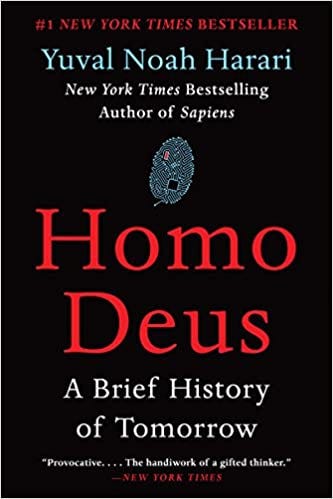Exploring the Future: Insights from "Homo Deus" by Yuval Noah Harari
Written on
Chapter 1: The Influence of Yuval Noah Harari
Yuval Noah Harari stands out as one of the leading authors of our time, renowned for his ability to synthesize insights across various disciplines, including science, history, and philosophy. His previous work, "Sapiens," examined the evolution of humankind, focusing on the cognitive, agricultural, and scientific revolutions that have shaped our species.
In "Homo Deus," Harari shifts his focus to the future, contemplating the intricate challenges humanity will face as technological and biomedical innovations progress over the coming decades. He posits that the next phase of human evolution may diverge significantly from our traditional understanding of what it means to be human:
Human nature is on the verge of transformation as intelligence becomes increasingly separate from consciousness. We have created intelligent machines capable of understanding our emotions better than we can ourselves. What implications will arise when these machines achieve even greater intelligence?
As we reflect on our past triumphs over famine, plagues, and warfare, Harari warns that we may be ill-prepared for the forthcoming crises of meaning, particularly as we become more reliant on technology. In contemporary society, more individuals succumb to obesity than starvation, and the elderly face greater risks from age-related illnesses than infectious diseases. The statistics are startling: the average American is far more likely to die from overeating than from terrorist attacks.
This raises profound questions: If we extend our lifespans to 120 or even 150 years, what will our lives signify? When will we cease working, and how will we sustain ourselves? How do we preserve the essence of being human in an age dominated by technology?
Humans no longer look to a higher power to dictate their fates. We stand at the pinnacle of our potential as homo sapiens, yet our narrative may evolve in unforeseen ways. Our extraordinary capacity to manipulate our environment is reshaping our identity. Here are some key themes from Harari's work:
- We are entering an era increasingly influenced by genetic engineering, robotics, artificial intelligence, and enhanced humans.
- We must confront essential questions about our identity, consciousness, and intelligence.
- Humanism, a belief system prioritizing human desires over divine authority, is evolving as we seek immortality, happiness, and power.
- The pursuit of these goals could render humanity obsolete.

Section 1.1: The Changing Face of War and Famine
War is increasingly seen as an outdated concept; people are more likely to take their own lives than to fall victim to conflict. Meanwhile, famine is becoming rare, with the risk of obesity now overshadowing starvation. Death itself is evolving into a technical issue to be addressed through advancements in technology and medicine. While we celebrate these achievements, we must also recognize that equality is diminishing, and the quest for immortality takes precedence.
Our triumphs stem from constructing complex networks that treat humans as data points. We are essentially machines for processing information, but algorithms can execute these tasks more efficiently than we can. As a result, we may lose agency over our destinies, with networks like governments leveraging our values to shape our realities.
The power of the modern state lies in its ability to process data, yet it is essential to remember that human beings operate behind these systems. As technology advances, it often outpaces governmental authority, leading to a future that is difficult to envision. Will there still be a place for humanity in 2100?
Individuals find it increasingly challenging to assert control over their lives as power shifts to networks and institutions. However, emerging technologies such as blockchain may empower individuals to resist the influence of corporations and states.
Section 1.2: The Rise of Dataism
As we extend our lifespans and access a wealth of information, we become entranced by algorithms that seem to cater to our unique needs. Yet, this reliance may lead to a loss of identity. Harari poignantly states, “The individual will not be crushed by Big Brother; it will disintegrate from within.” Corporations and governments will increasingly employ powerful algorithms that, while appearing to respect individuality, will categorize us into biochemical subsystems.
The new elite will merge their identities with intelligent machines, evolving into superhumans or “gods” endowed with unparalleled knowledge. Meanwhile, the rest of humanity risks becoming mere data points in their grand schemes.
The separation of intelligence and consciousness signifies a new reality where humans might experience suffering at the hands of those with superior intelligence. Harari urges us to consider our treatment of animals in industrial farming, drawing parallels to potential future scenarios for humanity. How will we fare when we are no longer the most intelligent species?
The first video titled "Homo Deus: A BRIEF HISTORY OF TOMORROW" features Yuval Noah Harari discussing the implications of technological advancements on human evolution, exploring themes of identity, consciousness, and the future of humanity.
In the second video, "Impact Books: 'Homo Deus' by Yuval Noah Harari," Harari delves deeper into the themes presented in his book, focusing on the pursuit of immortality and the quest for meaning in an age dominated by technology.
Chapter 2: Reflections on Humanity's Future
As we navigate this uncertain terrain, Harari prompts us to reflect on our current trajectory and consider what it means to be human in a world increasingly driven by data and technology. He challenges us to question our values and the narratives we construct, urging us not to lose sight of our humanity amid the rise of intelligent machines.